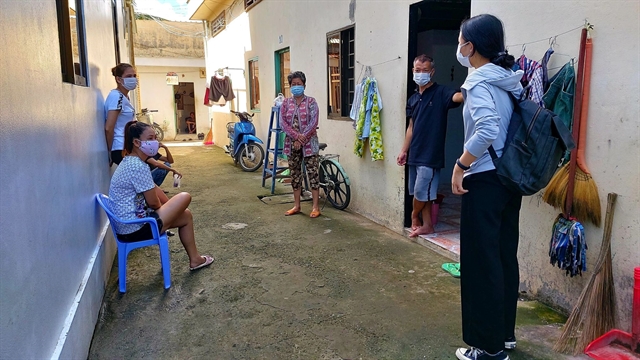 Society
Society

As the pandemic rages through the country, migrant workers in the city of Cần Thơ City are living hand to mouth and barely managing to survive

|
| Unemployed for more than two months due to social distancing, migrant worker Trịnh Thị Ngọc Loan in Cần Thơ City is struggling to make ends meet. VNA/VNS Photo Thu Hiền |
CẦN THƠ — Seeing the last of some instant noodles and vegetables in the kitchen, laid-off worker Trịnh Thị Ngọc Loan in the southern city of Cần Thơ could not hold back her tears.
“I don’t dare think about tomorrow,” she said.
Loan, from the southern province of Vĩnh Long, started working for a plant in Trà Nóc Industrial Zone in Cần Thơ City a few years ago. She, like many other workers in the industrial zone, rented a simple room in Residential Group No 2, Trà Nóc Ward, Bình Thuỷ District.
Having been laid off for more than two months since Cần Thơ City implemented a social distancing order under Directive 16, Loan is staying in the city, waiting for the day she can return to work.
“If I return to my hometown, I have to spend 14 days in a concentrated quarantine area and another 14 days when I back to Cần Thơ,” she said, adding that she even did not know if she would have meals in the following days.
“If my company re-opens when I’m at the concentrated quarantine area, I will not have my job anymore.
“Staying in the city at this time causes many difficulties for migrant workers like me. Now, I’m here with no job, no salary and don’t know when I can go back to work.”
Another migrant worker from Vĩnh Long Province working in Trà Nóc Industrial Zone, Lê Thanh Tân, said that before social distancing he had worked for a seafood processing company for more than a month.
Without income for more than two months, Tân and his wife only survive thanks to donated food.
“We have little food left while no one knows how long the COVID-19 pandemic will last. We have to use the food as economically as possible,” Tân said.
“A new school year is set to start, I now have no money to buy new books and notebooks for my children.
“Whenever my children phone me, they ask me when I will return home or when I will send them money to buy new books.
“I’m afraid of such questions. I try not to cry in front of them.”
Phùng Phú Hơn, a migrant worker from Sóc Trăng Province, said that he was laid-off for more than two months without getting any support from his company.
He and his neighbours, most of whom are unemployed, were not instructed to apply for any support offered by the Government and local authorities.
“We all now want to go back to work mostly,” Hơn said.

|
| Migrant workers in Cần Thơ City's Bình Thủy District hope to return to work. They have had to stay at home for more than two months due to social distancing. VNA/VNS Photo Thu Hiền |
Hoàng Văn Lung, a landlord, said that on seeing the difficulties of the workers during the pandemic, he offered them free rent for a month. Those who can not afford rent now can pay him later.
Lung also called on his friends to donate rice, vegetables and fish sauce for the needy workers.
Nguyễn Ngọc Bích, a tenant, said that in her neighbourhood dozens of workers were struggling to lead regular lives due to the pandemic.
“Now more than ever we should care and share,” Bích said.
Preparing some food to celebrate the 15th day of lunar July, Bích and her daughter divided the food into small parcels and then gave them to neighbours.
As of August 27, a total of 1,031 out of 1,090 companies in Cần Thơ City have suspended operation due to the pandemic, forcing 65,872 workers to lose their jobs.
A total of 157 companies out of a total of 170 companies in industrial and processing zones suspended operation, making nearly 40,000 workers jobless.
According to the province’s Labour, Invalid and Social Affairs, only 451 laid-off workers in five districts of Bình Thủy, Ninh Kiều, Ô Môn, Cờ Đỏ and Vĩnh Thạnh received financial support worth, VNĐ 1.5 billion (US$ 66,000).
Cần Thơ City’s Trade Union reported that about 7,000 workers heavily affected by the pandemic have not received any support under the Government’s Resolution No 68 dated early July on policies to support employees and employers facing difficulties due to the pandemic, worth a total of VNĐ26 trillion (US$1.13 billion). VNS




